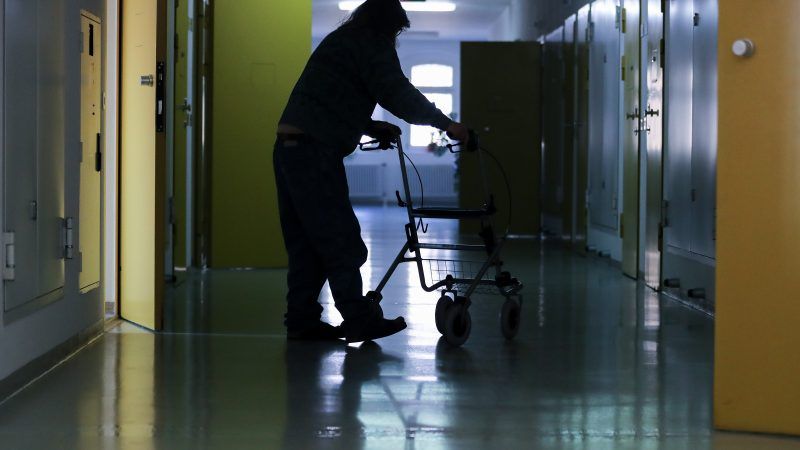Pressure Grows on Biden To Rescind Memo That Would Send Thousands Released on Home Confinement Back to Federal Prison
More than 4,000 people released on home confinement could be sent back to federal prison after the pandemic. Senators and advocacy groups say it's cruel and unnecessary.

A Justice Department memo released shortly before President Donald Trump left office could send roughly 4,000 people who were transferred to home confinement during the COVID-19 pandemic back to federal prison.
Now, a bipartisan group of lawmakers in Congress and criminal justice advocacy groups are demanding that the Biden administration rescind that memo, arguing it would be unnecessary and cruel to those who've started rebuilding their lives on the outside.
The memo, issued on January 15 by the Justice Department's Office of Legal Counsel, says that those transferred from federal prison to home confinement last year due to a provision in the Coronavirus Aid, Relief, and Economic Security (CARES) Act expanding releases of elderly and at-risk inmates will have to return to prison once the pandemic is deemed over.
At a Senate Judiciary Committee hearing Thursday on the Federal Bureau of Prisons (BOP) response to COVID-19, Sens. Chuck Grassley (R–Iowa) and Dick Durbin (D–Ill.) questioned BOP Director Michael Carvajal about the potential re-incarceration.
"Obviously, if they can stay where they are, it's going to save the taxpayers a lot of money, and it would also help people who aren't prone to re-offend and allows inmates to successfully re-enter society as productive citizens," Grassley said.
Grassley noted that only 151 of the roughly 24,000 inmates who were transferred into home confinement since last March had violated the terms of their release.
"The president recently extended the national emergency," Carvajal said. "There's no rush to bring these [people] back."
Carvajal also said the BOP is working with the laws on the books. The CARES Act did not change the statutory requirements for when a federal inmate can be transferred to home confinement.
"If they have successfully been out there, we're going to use good judgment and common sense and work within the law to make sure we place them appropriately, Carvajal said. "We have plenty of bed space in our minimum-security camps. I simply ask that either the statute is changed, or that people understand that we're working within the parameters we've been given."
More than two dozen members of Congress sent President Joe Biden a letter last week urging his administration to reverse the memo.
"The vast majority of those people on home confinement today have reunited with their families and are working and contributing to society," the letter says. "They were not told they would have to return to prison and forcing them to do so would be cruel and devastating. You rightly pledged to reduce the federal prison population. Sending thousands of people back to federal prison who have already proven that they do not need to be there would undermine this commitment and would undermine, not advance, public safety."
Among those facing re-incarceration is Dennis Alba. "I was granted home confinement last May," Alba wrote to FAMM, a criminal justice advocacy group. "I got a great job and rented an apartment a few miles from the office, and I can walk to work. I am 71, so readjusting after 19 years in fed prison takes a little time. If I have to go back to prison, I would lose everything I have worked so hard for. I NEVER would have gone through the expense of buying furniture, clothes, renting a place to live and other expenses if I know I would be returning to prison."
FAMM, along with the American Civil Liberties Union, Prison Fellowship, the Brennan Center, and other criminal justice organizations, is also urging Biden and Attorney General Merrick Garland to rescind the memo.
And although Carvajal assured senators that the BOP is prepared to handle an influx of thousands of inmates, the BOP system has been notoriously short-staffed for years.
"We don't have the staff," Council of Prison Locals Southeast Regional Vice President Joe Rojas told Reuters. "We are already in chaos as it is as an agency."
The Justice Department did not respond to requests for comment.



Show Comments (30)